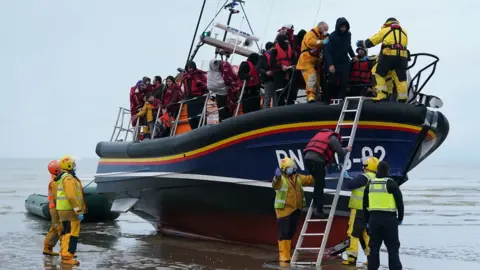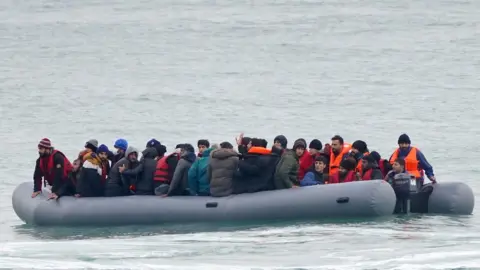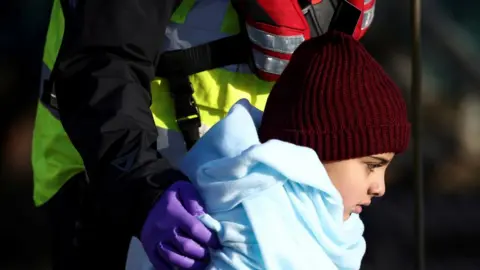The UK migrant dilemma - it's all about Brexit
 PA Media
PA MediaThe almost daily sight of migrants jumping out of an inflatable onto a beach below Kent's iconic white cliffs is now, we are told, the government's number one priority. But why?
Given Home Office plans to use Border Force vessels to push precarious dinghies back into French waters, it seems improbable that it is concern about the safety and welfare of the migrants.
And given that the latest official figures suggest the UK currently has negative net migration - more people leaving than arriving - it is unlikely to be about numbers, especially for a country with more than a million job vacancies for the first time in its history.
In any event, when it comes to offering protection to asylum seekers and refugees, proportionately the UK offers sanctuary to far fewer people than Germany, Spain, Greece or France.
No, concern inside Number 10 is driven by the politics of Brexit: this is a government elected on a promise to take back control of Britain's borders and strike our own path on immigration and asylum outside the EU.
Ministers want to illustrate how Brexit has restored sovereignty and independence to the United Kingdom.
Yet the record number of migrants arriving in small boats across the Channel demonstrates impotence, rather than control. No surprise that polls suggest a clear majority of Tory voters at the last election think the response to the challenge is simply too soft.
The problem for the government is that you cannot simply pull up the drawbridge. Controlling the country's borders requires international agreement and co-operation.
For the moment, with few bilateral deals in place, and outside EU arrangements, Brexit has made the situation more complicated, not less.
For example, the Home Office has introduced post-Brexit rules barring people who have come through a "safe" third country from claiming asylum in the UK. Those deemed "inadmissable" should be removed.
So, of the more than 25,000 who have crossed from France in small boats this year, how many have been returned? Tom Pursglove, the minister with responsibility for tackling what the government calls illegal migration, was asked exactly that last week, - by Adam Holloway and Yvette Cooper, MPs on the Commons' Home Affairs Committee.
His answer was five - five people arriving by small boats on UK shores this year, have been returned to EU states since January.
 PA Media
PA MediaWhen part of the EU's "Dublin" arrangements, Britain requested the return of approximately a quarter of asylum cases to our European neighbours.
Now outside the European Union, the UK currently has no return arrangements with any EU country. The government proposed a post-Brexit replacement for the Dublin arrangement - but the EU turned it down.
Another idea is to discourage migrants from crossing the channel by employing the Australian approach of processing asylum seekers offshore.
As soon as the migrants arrive, they would be shipped off again. Options under discussion at the Home Office have included Rwanda, Ascension Island and Albania. Again, the difficulty is completing cost-effective agreements with other states. None currently seem close.
The government's longer-term plan comes with the reform of the asylum system contained in the Nationality and Borders Bill.
This would distinguish between asylum seekers who use clandestine methods to reach the UK and those who come via recognised refugee schemes, the former getting a time-limited opportunity to prove they are fleeing persecution, the latter being offered indefinite leave to remain in Britain almost immediately.
 Reuters
ReutersThe government is being urged to create more safe routes for refugees, but ministers want such arrangements to be limited to those coming directly from a country of persecution, with Britain choosing who is eligible and a focus on women and children.
There is significant pressure on the government to get tough with what the Home Secretary calls illegal migrants, and to smash the business model of the criminal gangs who profit from people-trafficking.
But international migration is an international challenge and, in the end, however much ministers might want to operate independently, will require international solutions.